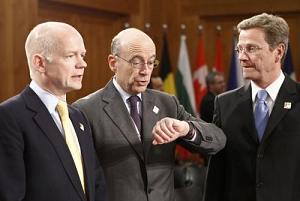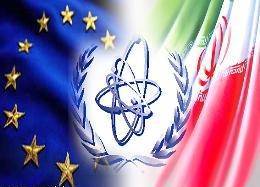As it threatened on Monday to tighten sanctions on Iran, the European Union shied away from wielding the threat of military action.
 As it threatened on Monday to tighten sanctions on Iran, the European Union shied away from wielding the threat of military action.
As it threatened on Monday to tighten sanctions on Iran, the European Union shied away from wielding the threat of military action.
French Foreign Minister Alain Juppe said after talks with European Union counterparts that the EU would reinforce sanctions against Tehran by asking the European Investment Bank (EIB) to freeze loans to the Islamic Republic.
But Juppe warned against military intervention, saying it “would be the worst thing and it would drag us into an uncontrollable spiral.”
German Foreign Minister Guido Westerwelle said too that military action would be “counter-productive.”
Only British Foreign Secretary William Hague said all options should remain on the table.
Asked to comment on talk of a strike against Iran, Hague said: “We are not considering that at the moment. We are not calling for or advocating military action.
“At the same time we say all options should remain on the table.”
In a statement, the 27 EU ministers voiced “increasing concerns” over Tehran’s program and the lack of progress on the diplomatic front, a week after the International Atomic Energy Agency claimed it had “credible” intelligence suggesting Iran carried out work towards building nuclear warheads.
“We urge Iran to address the international concerns over the nature of its nuclear program through full co-operation with the IAEA and by demonstrating readiness to engage seriously in concrete discussions on confidence-building steps,” the ministers said.
Given that Iran is showing “zero” interest in negotiating, Juppe said some avenues were available to the ministers.
“We will reinforce our sanctions,” he said. “We will ask the EIB to stop investing in Iran.
“That is the weapon we can use today—and that we will use with determination.”
Swedish Foreign Minister Carl Bildt also opposed military action, saying “some hype” was built around last week’s IAEA report.
“I don’t think any military response is justified or called for. We have to solve this by diplomatic means,” Bildt said.
